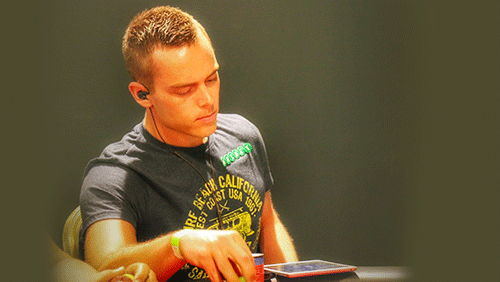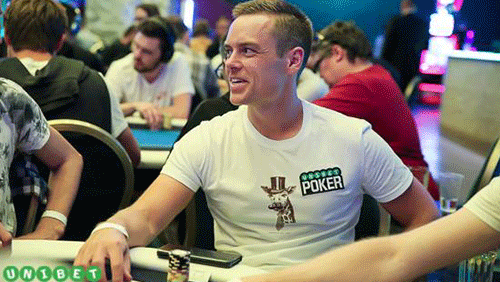Lee Davy catches up with the Unibet Ambassador, Espen Uhlen Jørstad, to figure out what makes him so damn good at poker.
Espen Uhlen Jørstad took some detours on his way to his role as Unibet Ambassador.
The Norwegian star is a former World of Warcraft addict, professional coffee maker, former beer brewing junkie, and even spent some of his youth serving in the Norwegian military.
But what does he know about poker?
Let’s find out, shall we?
Who are you?
“Espen Uhlen Jørstad, 29 years old, recently lived in Malta, but currently living nomad life.”
What is your claim to fame?
“I don’t really wanna say I have one. I’ve made some money playing card games, but I feel more accomplished thinking about stuff I reached in other areas of life.”
 When did your aspirations to become a poker player begin?
When did your aspirations to become a poker player begin?
“I started playing poker back in 2004 when my clan mate in Warcraft III introduced me to the game. I got bitten by the bug immediately, and started watching all the WPT/WSOP coverage, as well as any other poker shows.”
How do you spend the first hour when you wake up?
“I stumble my way like a zombie into the kitchen, to set up my coffee grinder, water boiler and french press. Making that first cup of coffee in the morning is basically like a meditation for me, and smelling those fresh coffee beans reminds me of how good life is and how we all need to get better at appreciating the small stuff! I usually enjoy that first coffee while listening to an audiobook or a podcast. That audiobook/podcast will also follow me outside after the cup is empty, for a quick morning walk and vitamin D boost.
“At least this was the routine I was trying to follow while living in Malta. Going forward things are naturally gonna be quite different, as I will live life out of a suitcase, and either wake up in a hotel/Airbnb/couch of a friend.”
What time of the day do you find it easier to play poker and why?
“Morning and evening. Morning because I find myself more energised and focused. Evening because more and better games are running.”
Do you have defined goals for how many hands/sessions you play in a week?
“No. I know it’s gonna be impossible to follow anyway. I just try to grind as much as I can, whenever I can.”
Where do you play online, what types of games, and stakes?
“For the past couple of years, I’ve played 98% of my volume on Unibet. My main game is cash games, and I play NL200-NL800.”
Do you have a particular routine that you go through before you begin an online poker session?
“Not really. Prepare coffee/tea/water. I would like to say that I meditate before every session, but that would be a lie.”
When you first sit down to play poker how do you begin?
“I usually just open the NL800 tables to see what the action is like. If there is no good action, I’ll do the same at NL400. If that’s no good, I’ll hit up the NL200 tables.”
Describe your grinding station set up.
“Well, it HAS been a gaming laptop, attached to two 27” curved Samsung monitors, with an external keyboard, mouse, etc. Going forward it’s gonna be toned down a bit with only one extra monitor and a mouse.”
What tools do you use when playing poker, online?
“In the past when I played on other sites I used PokerTracker. Since Unibet does not allow HUDS/scripts/trackers, I now use nothing except for YouTube –> Best of Hans Zimmer.”
What’re your thoughts on listening to music when playing? If you do, what do you listen to?
“Yeah, for me it helps to keep focused. I listen to a lot of different stuff. Everything from hip hop (Jedi Mind Tricks, Army of the Pharaohs, La Coka Nostra), and rock/metal (Iron Maiden, Rage Against The Machine, Dimmu Borgir) to more relaxed funk/lounge style music (Gramatik, different movie soundtracks, etc.).”
If you use a HUD then how do you use it?
“On the rare occasion that I play tournaments, I use it. Mostly just for VPIP/PFR/3B stats though, as I naturally don’t have huge sample sizes for my opponents.”
What system do you use for taking notes on your opponent’s?
“On Unibet, you can change your alias three times a day and keep five different aliases at all times. Note taking, therefore, becomes kinda useless. Short term mental notes are where it’s at!”
Do you have a particular warm down routine after you have finished a session?
“No specific routine. Usually just grab some food and relax with some GoT/other TV show.”
What do you eat and drink when you play?
“Usually stuff that’s easy to prepare and easy to eat. Favourite is Greek yoghurt/quark/skyr with cinnamon, nuts and some fruit.”
What is your process of review?
“If I get into spots where I am unsure I will write down notes quickly in a word document, to review the spot in PioSOLVER/HRC later. I also discuss a lot of spots with friends.”
How do you educate yourself about poker?
“Right now I am spending a lot of time with the tournament masterclass course from Bencb/Raiseyouredge. I’m also reading books from time to time, and I’m now in the middle of “No-Limit Hold’em For Advanced Players” by Matthew Janda, which I’m enjoying.”
How do you improve your mental state?
“All the usual stuff. Exercise regularly, healthy diet, avoid binge drinking, meditate, reflect, appreciate.”
How much of your time is spent playing versus learning?
“It’s probably 4/1 in favour of playing, but I strive for a ratio closer to 2/1.”
 How do you know when to stop a session?
How do you know when to stop a session?
“I usually just end the session if I catch myself making a bad call or bluff that I would not make playing my A game. If the game is very juicy though, it’s tough (and probably not even very smart) to throw in the towel.”
Are you consciously trying to emulate the style of a particular player? Do you have people you look to as models for your game?
“Not really. I just try to pay attention to the plays that the best regs are making, and then implement parts of that into my own game.”
Is poker easy? Does it come naturally to you?
“Ask me this ten years ago, and I would say yes and yes. Today the games aren’t easy anymore, but I would say it comes pretty naturally, as I enjoy games, math, puzzle solving and psychology.”
What books/courses/mentors have helped improve your game (doesn’t have to be a poker book)?
“Initially, Super System 2 by Doyle Brunson, Harrington on Hold’em by Dan Harrington and Theory of Poker by David Sklansky. In later years the aforementioned book by Matthew Janda.”
Do your surroundings affect your work, how?
“I think that surrounding yourself with people and surroundings that make you happy will influence your mindset, so you will play your A-game more often and get distracted less. So I actively seek out the company of people who both can inspire me, lift me up and make me happy. On the other side I also actively try to avoid spending time with people who will drag me down or bring their unhappiness/complaining/what have you into my life.”
Was there ever a time when you didn’t want to play poker? How did you get out of the funk?
“Yeah for sure. I started playing poker in 2004 and played a lot up until 2009 or so. After that, I kinda lost interest for a few years. I kept playing, but I also took a masters degree in brewing science and was way more interested in beer and brewing than poker for those years. It’s just been the past two years that I took up poker on a serious level again, and find myself enjoying it now.”
How does poker make you feel?
“Competitive. Simple as that. I always want to be good at what I am doing, and poker brings that aspect of my personality out.”
What is the one thing you know you have to change after answering these questions?
“Play more, study more and meditate more.”
What is the one question I didn’t ask but should have asked, and now answer it?
“How important do you think like improving mindset, mental health, etc. is in today’s poker climate? – I think it’s tremendously important, and many people in poker have now realised this. As edges get smaller and smaller in terms of theoretical ability, players need to find those edges in other areas. If you can play your A-game for twice as long as your opponent, this will influence your win rate by quite a bit.”